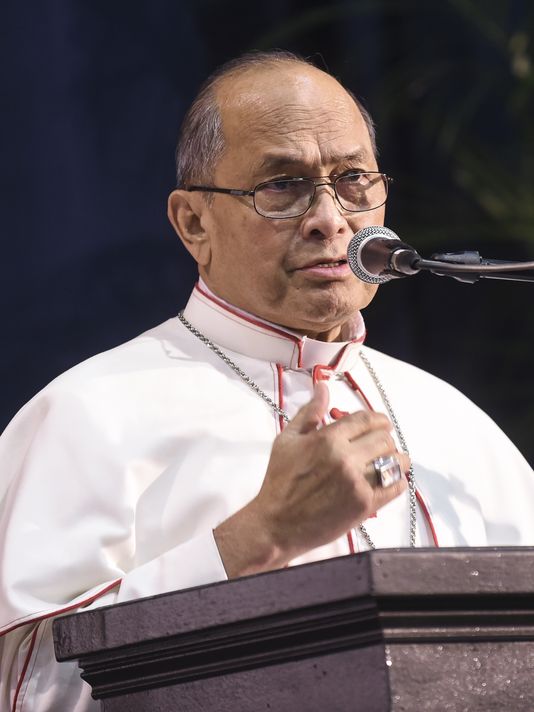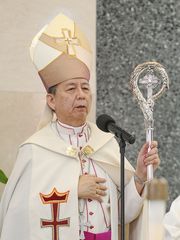Archdiocese’s Position Unchanged Despite Apuron’s Message
By Haidee V Eugenio
In a written statement dated Aug. 25, Archbishop Anthony S. Apuron said Pope Francis never directed him to rescind a deed restriction that gives a seminary and a theological institute the legal right to use church property in Yona. Apuron said he alone can lift that property restriction, but said he cannot in his conscience lift that restriction. “To lift the restriction would not only damage the ability of the Seminary to exist and carry out its canonical mission, but it would eliminate the fundamental canonical requisite for the existence of a public juridic person,” he said in the statement. A public juridic person in the Catholic Church is the equivalent to a civil corporation, according to the website of Personal Ordinariate of the Chair of St. Peter, a Texas-based diocese. Catholic schools, Catholic hospitals, parishes and other Church groups are considered public juridic persons. “A restriction on use is obviously not an alienation, and only I, the Archbishop of Agana, or my Successor, as ordinary and Sole Member, have the authority to lift this restriction,” Apuron’s statement said. The Aug. 25 statement is only Apuron’s second public statement since the Vatican placed him on leave in early June when allegations that he sexually abused altar boys in Agat in the 1970s started coming out in May. The first statement was a video that appeared to be filmed at the Vatican in Rome. Apuron said he has always obeyed the pope, reacting to Archbishop Savio Hon Tai Fai’s statement last week that Apuron hasn’t properly carried out the Holy See’s instruction for more than a year now to rescind and annul a deed restriction on the property. “I wish to declare that this is absolutely false and it is causing real, grave and immediate damage to the Church in Guam and to my good name, spreading scandal and confusion among the faithful,” Apuron said. Apuron echoed an earlier statement by the rector of the seminary that only he — Apuron — as archbishop of Agana, or his successor, has the authority to lift the restriction on the Yona property, now valued between $40 million and $75 million. Hon called upon the seminary and the institute to obey the pope’s directives and renounce, “without any litigation,” all rights to use the property, which he said belongs to the Archdiocese of Agana.
Hon, in a statement Friday night, said the Archdiocese of Agana’s position of Aug. 18 “remained unchanged,” adding that he received directly from Apuron the exact message that Apuron released to the media. “This message was read and discussed in a meeting with the Presbyteral Council, in which the position of the archdiocese expressed in an announcement made on Aug. 18 remained unchanged,” Hon said. Hon reiterated his Aug. 18 request that the "community which now enjoys in perpetuity the use of the property to spontaneously and effectively renounce, without any litigation, such a benefit obtained from the Archdiocese of Agana.” Apuron said the seminary rector, the board of directors and the board of guarantors don’t have any authority to lift such restriction. “I am convinced in conscience that I cannot lift the restriction on this property,” Apuron said in his two-page statement sent to the media on Friday by his counsel, Attorney Jacqueline Terlaje. Pacific Daily News sent Terlaje follow-up questions about the statement, and she acknowledged receiving the questions. Terlaje said she would provide a response Saturday. Terlaje is Apuron’s counsel in a $2 million libel and slander lawsuit that former altar boys filed against Apuron, the Archdiocese of Agana and up to 50 other persons. Apuron has not been charged with any crime. Apuron concluded his statement by saying the pope did not direct him to rescind the Yona property restriction, and that the pope also granted his request for a canonical trial. He also said Pope Francis sent Hon to oversee the local church while Apuron is “involved in clearing my name and proving my innocence.” “Now that the Holy Father has granted my request of a canonical trial, I hope that things will be cleared soon,” Apuron said. The Archdiocese of Agana bought the former 100-room, oceanside Accion Hotel in Yona more than a decade ago for $2 million. It is one of the Guam Catholic Church’s largest real estate assets. ‘Over my dead body’ Apuron cited three reasons for not lifting the deed restriction on the Yona property. First, he said during his leave of absence, neither he nor the Apostolic Administrator — Archbishop Hon — are supposed to take decision, which Apuron said would alter the future of the archdiocese. Second, Apuron said had he not put this restriction, the property probably would have already been sold, losing an important ecclesiastical good. He indirectly referred to a casino operation, which he said big investors recently began in Saipan. Third, Apuron said he believes that the formation of priests is the most fundamental challenge today for the Church and for the evangelization, which he said was why he acquired the property. The property in Yona now is being used by the Redemptoris Mater Seminary and The Blessed Diego Theological Institute. “I have always defended the moral life of the island opposing establishments, which would bring money to few and moral misery and degradation to many,” Apuron said. He said some people proposed to him the sale of the Yona property as a way to solve short-term financial issues, thinking that the property would be the ideal place for such establishment. He was referring to recent investments on Saipan, a multi-billion casino. “If I had listened to them I would have probably have avoided the present turmoil. Instead, my answer was: ‘Over my dead body’, because it would be irresponsible for a father to forfeit the future of his children, that is, to cash in on the property and destroy the possibility to form priests for the future,” he said. Apuron said the seminary and theological institutions, which he describes as ecclesial institutions, ordained 17 priests serving the Archdiocese and four deacon candidates awaiting their ordination. “Moreover, almost 40 seminarians from Guam and from other dioceses of the Pacific are studying at the seminary and the institute,” Apuron said. The Diocese of Samoa in Pago Pago, American Samoa, and the Archdiocese of Samoa in Apia, Samoa, withdrew from Guam up to 10 of their own seminarians that were studying to become future priests at the Redemptoris Mater Seminary. ‘Unusual way’ Hon, in a statement last week, said the Yona property belongs to the Archdiocese, but its use was deeded away, indefinitely, to the seminary and institute. Creating the deed was an unusual act, according to Hon, who said use of property normally is conceded through an internal Ecclesiastical agreement. “In truth, more than a year ago, the Holy See recognized the problems such a Deed Restriction created,” Hon said, adding that the pope instructed Apuron more than once to rescind and annul it. “Clearly, this instruction has not been carried out accordingly.” Apuron, in his statement, said the restriction of the use of the property was decided and done by him as archbishop of Agana to protect the seminary and theological institute, which he said, are serving Guam and the whole Pacific “without jeopardizing in any way the ownership of the Archdiocese.” While Apuron said he is pleased to see that Hon has publicly declared the Archdiocese is the legal owner of the property, he said the recent declaration that such an act of concession was not done in a usual way by an internal Ecclesiastical agreement doesn’t correspond to the truth. He said in 2002, he received unanimous consent and support by both the College of Consultors and the Finance Council to acquire the property known as Accion Hotel for the purpose of permanently housing the Redemptoris Mater. “The restriction of use was placed on the property following proper canonical procedures of consultation with both the Finance Council and the College of Consultors; Mons. Hon personally received the documentation during the apostolic visit in January 2015, and, since his appointment, he has had access to all the documents in the Chancery,” Apuron said. The Concerned Catholics of Guam said this isn't true. Apuron added that the Yona property isn’t controlled by any community. For years, the group Concerned Catholics of Guam has argued that Apuron gave control of the Yona seminary to the Neocatechumenal Way, but the Archdiocese of Agana under Apuron, according to attorney and former island Sen. Robert Klitzkie, fought tooth and nail to disprove the group’s claim. Klitzkie has been a supporter of the causes of the Concerned Catholics of Guam Inc., a group that wants the archdiocese to again take full control of the Yona property. Proper legal action, Klitzkie explained, includes having the RMS corporation’s board of directors adopt a resolution authorizing the lifting of the deed of restriction and the board of guarantors has to abide by that resolution. Klitzkie said the four guarantors are Apuron and New Jersey-based high-level members of the Neocatechumenal Way — Giuseppe Gennarini, Claudia Gennarini and the Rev. Angelo Pochetti. Apuron said the act of granting a restriction on the use of the property to the seminary and theological institute is an act of justice and law because it insures to this entity the proper and basic means to achieve its mission, which are those of stability and continuity.
|
.
Any original material on these pages is copyright © BishopAccountability.org 2004. Reproduce freely with attribution.

